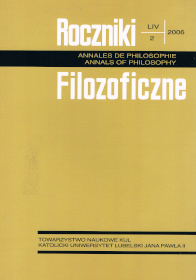Plato’s Ontology and Cosmic Evolution
Abstract
Abstract mathematical formulae are our “mother tongue”, thanks to which we are able to develop a creative dialogue with our physical environment. The application of the language of mathematics gives us access to valuable information about events which occurred billions years ago and so allows us to reconstruct the history of the universe. This amazing property of nature inspires a non-trivial philosophical question: Why are there the mathematically described universal laws of physics at all, when nature could have been only an uncoordinated disorder?
The existence of the universal laws of nature seems to constitute the essence of the ontological structure of the world. Various authors call this basic field of formal structures – the matrix of the universe, the field of rationality, the formal field, the Logos, the Absolute, etc. Jan Łukasiewicz, the well-known representative of the Polish School of Logic, argued that the reality of ideal mathematical structures independent of human experience could be regarded as an expression of God’s presence in nature. Regardless of our terminological preferences, this structure can be regarded as a basic level of physical reality where the necessitarian interpretation of the laws of nature is confirmed and the astonishing effectiveness of mathematics could be explained.
References
Cartwright N.: No God, no Laws, [w:] God and the Laws of Nature, Angelicum, Milano 2005, s. 183-190.
Cross R. C., Woozley A. D.: Knowledge, Belief and the Forms, [w:] G. Vlastos (red.), Plato I. Metaphysics and epistemology, University of Notre Dame Press, Notre Dame 1978 s. 82-95.
Dampier-Whetham W. C. D.: A History of Science and its Relations with Philosophy & Religion, Cambridge University Press, London – Macmillan Co., New York 1930.
Dezza P.: Metaphysica generalis. Praelectionum summa ad usum auditorum, Roma 1959.
Haldane J. B. S.: Everything has a History, George Allen and Unwin Ltd., London 1951.
Hartle J. B., Hawking S. W.: Wave Function of the Universe, „Physical Review” D 28 (1983), s. 2960.
Hauksbee F.: Physico-Mechanical Experiment on Various Subjects, D. H. Roller, New York 1970 (reedycja).
Loux M. J.: The Possible and the Actual: Readings in the Metaphysics of Modality, Cornell University Press, London 1979.
Łukasiewicz J.: W obronie logistyki, „Studia Gnesnensia” 15 (1937), s. 219-223.
Pagels H. R.: Perfect Symmetry, Bantam Books, Toronto 1985.
Penrose R.: The Emperor’s New Mind: Concerning Computers, Minds, and the Laws of Physics, Oxford University Press, New York 1989.
Penrose R.: The Road to Reality. A Complete Guide to The Laws of the Universe, Alfred A. Knopf, New York 2005.
Pianek M.: Maxwell’s Influence in Germany, [w:] James Clerk Maxwell: A Commemoration Volume, Cambridge University Press, Cambridge 1931, s. 45-65.
Ross W. D.: Plato’s Theory of Ideas, Clarendon Press, Oxford 1951.
Sayre K. M.: Plato’s Ontology. A Riddle Resolved, Princeton University Press, Princeton 1983.
Strawson P. F.: Particular and General, „Proceedings of the Aristotelian Society” 54 (1953-54).
Titschmarh E. C.: Obituary of G. H. Hardy, „Journal of London Mathematical Society” April 1950, s. 81-88.
Whitehead A. N.: Process and Reality, Macmillan, New York 1957.
Whitehead A. N.: Adventures of Ideas, Macmillan, New York 1961.
Życiński J.: Bóg i ewolucja. Podstawowe pytania ewolucjonizmu chrześcijańskiego, TN KUL, Lublin 2002.
Życiński J.: Laws of Nature and the Theological Meaning of Cosmic Evolution, [w:] S. Moriggi, E. Sindoni (red.), Dio, la Natura e la Legge, Angelicum, Milano 2005, s. 15-26.
Copyright (c) 2006 Roczniki Filozoficzne

This work is licensed under a Creative Commons Attribution-NonCommercial-NoDerivatives 4.0 International License.





